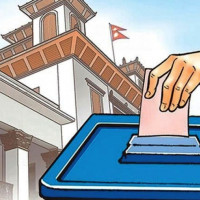- Friday, 26 December 2025
Enabling Constitution To Work For People
We celebrate Constitution Day (Sambidhan Diwas) on the 3rd of Aswin every year, with this year's day falling on September 20. This year, as we are going to celebrate Constitution Day, we are also mourning the passing away of Subas Nembang, the founding father of the democratic federal constitution, who put in unremitting efforts for the enactment of this basic law of the land. Nembang, who passed away last week, had chaired the Constituent Assembly for two terms in a row. It was only in the second term that the assembly was able to document, finalise, agree, and enact the federal republic constitution of the nation.
Nembang's flexibility, accommodativeness, and patience in handling negotiations on the complex and intractable issues, terms, and provisions of the constitution were, among others, behind the shaping of the supreme legal document despite challenges and constraints. The most intractable issue, difficult to negotiate and reach consensus on, was the reorganisation of the state in consonance with the spirit of federalism. As a multicultural and multilingual society, several ethno-cultural groups have had their respective stakes, issues, and interests in the writing of the constitution of Nepal. Needless to say, the constitution is not just the basic law for the governance of the country. It is a vehicle for the nation’s progress and prosperity. It reflects the best of the past democratic traditions of the country. It is expected to enable society to cope with the needs of the present and possess enough resilience to meet the challenges of the future. Likewise, the constitution is also a living document, not for one or two generations but for generations to come. In fact, the clauses of the Constitution of Nepal, like the constitutions in many democratic countries, have been made practically flexible so that amendments could be carried out as and when the situation demanded.
The Preamble to the Federal Democratic Constitution of Nepal is very significant in the sense that it is packed with promises to ensure justice, social, economic, and political liberty, equality, and fraternity. However, the creation of an egalitarian social order remains an unfulfilled wish, and no meaningful efforts have been made to this end. Recently, there was an initiative to incorporate a provision in the proposed Education Act to convert private schools into not-for-profit trusts, which could contribute to creating uniformity in the public education system. But the government backtracked on it in the face of the resistance shown by private school owners. The right to education enshrined in the constitution has not thus been taken into due consideration, which violates the principle of egalitarian values and ethos.
The important aspect of the constitution has been that it makes the country a federal republic, imbibing the ideals and values of democracy and discarding the hereditary rule of a family or clan. Constitutionalism in Nepal is influenced and inspired by the democratic revolutions that reject the rule of inherited domineering elites, aristocracies, and absolute monarchies. According to the constitution, the sovereignty and state authority of Nepal are vested in the Nepali people. All the Nepali people, with multiethnic, multilingual, multi-religious, and multicultural characteristics, have common aspirations, and they are united by a bond of allegiance to national independence, territorial integrity, national interest, and the prosperity of Nepal.
The democratic constitutionalism envisaged in the constitution refers to representative democracy with an elected head of state who serves for a limited term. A Republican presidency is in contrast to states with a hereditary monarch. It intends to ensure that the inalienable rights of life, liberty, and the pursuit of happiness are not trampled upon by the coercive power of the state or the whims of a monarch. However, contemporary political developments illustrate that the wishes and aspirations of the people have not been taken care of properly. The way public institutions created by the constitution are made to work at the whims and mercy of the party leaders indicates the extent to which state policy implementers can abuse public resources to serve their own vested interests. It is often said that getting the concept and institutions of a constitutional republic introduced in a country is challenging; no less daunting has been making them institutionalise and sustain them for posterity's political interests. It was our incessant bickering over the worthless issues and causes dictated and motivated by our own partisan and self-centred interests that we have maligned the values of the courts, bureaucracy, and police organisations devoid of any sense of responsibility and accountability. This goes against the notion of constitutionalism.
The wrangling over the appointment of key public positions and the trend of spoil sharing even in the judicial institutions indicate the dominance of sheer partisan interests at the cost of the glory and majesty of the public institutions. The setback meted out to constitutional republicanism is called the reversal of democracy. This has occurred in several nations at different times in history. This has primarily happened, as pointed out above, due to the deviousness of political leadership or systemic failures of democratic regimes to address the needs and aspirations of the people. The growing inability to provide welfare, prosperity, equity, justice, domestic order, or external security has caused disenchantment towards the system and a diminishing of constitutionalism in Nepal.
It is, therefore, necessary that the democracy and ideals of constitutionalism be strengthened through performance and delivery to meet the aspirations of the people. It is important to assure that democratic republican politics not only deliver but are also practiced as a way of life for the people. This entails maximising the accountability and transparency of the holders of political power and bureaucratic offices across all levels of the government created by the constitution.
(Rijal, PhD, contributes regularly to TRN and writes on contemporary political, economic and governance issues. rijalmukti@gmail.com)















